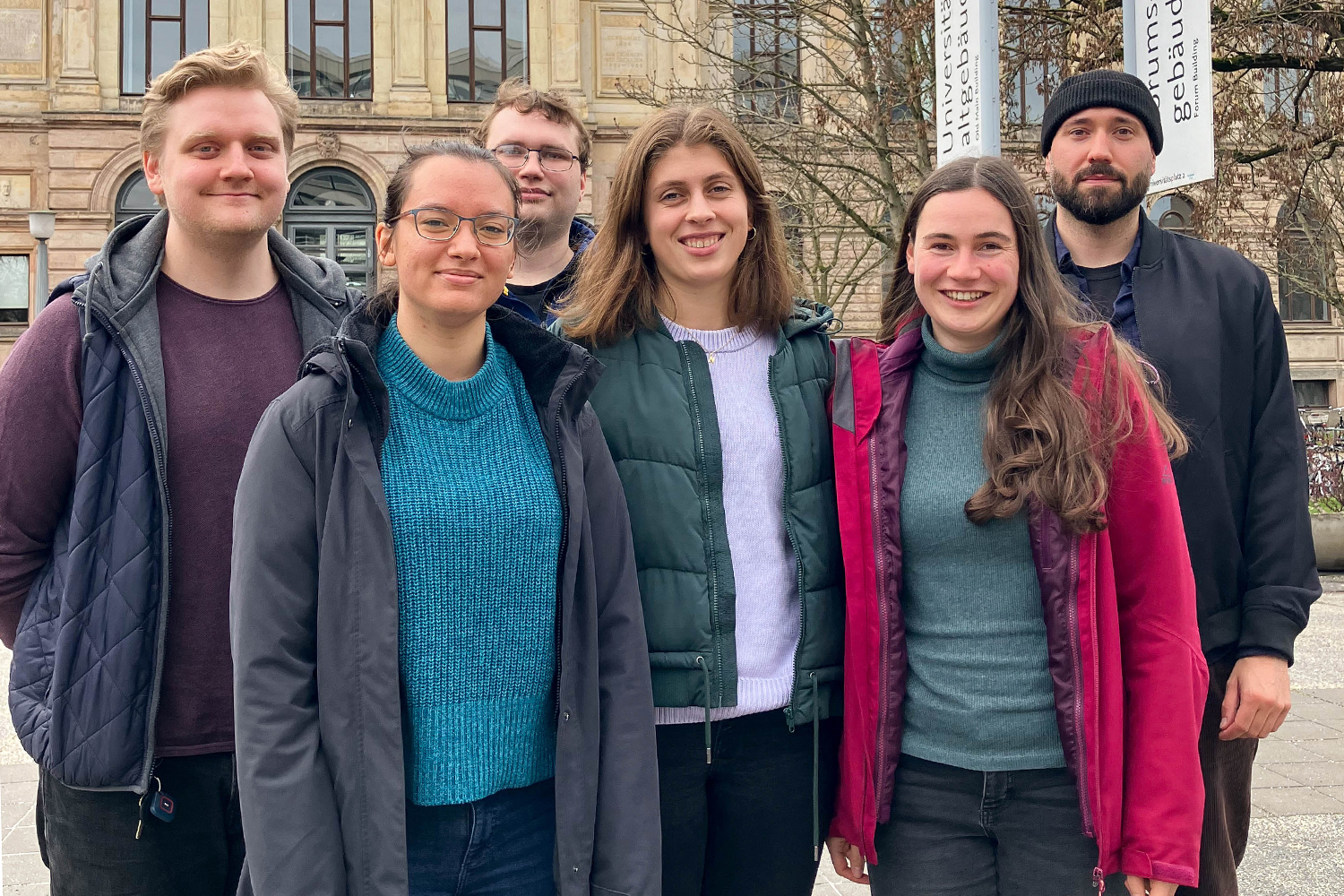Towards greater equality in education Student initiative helps disadvantaged pupils
Whether it’s German, maths or English, many children and young people could do with help with their schoolwork. But not every family can afford it. That is why students at Technische Universität Braunschweig offer free tuition. A commitment that pays off for both sides. But the waiting list is long.

Back row (from left): The three tutors Alexander Reeb, Maximilian Jede, Sören Meier. Front (from left): The organisation team Julia Sugijanto, Norina Greuner, Johanna Bürger. Photo credit: Hannah Kreß/TU Braunschweig
It all began in October 2020, when Johanna Bürger received an email in her inbox from the national board of the “StudyTutors” initiative (formerly ” Studenten bilden Schüler”). In addition to information, it also asked whether she would be interested in setting up a new branch in Braunschweig. Johanna Bürger, at the time still a Master’s student in physics at TU Braunschweig, didn’t hesitate for long: “I had always wanted to do voluntary work in the field of educational justice, and I had enough time because of the coronavirus. It was a perfect fit”. Together with two other students and with the support of the national association, she quickly set up the Braunschweig branch.
Educational success independent of family background
The principle of StudyTutors: children from financially disadvantaged backgrounds, whose families cannot afford traditional private tuition, are tutored by student volunteers. “We want to create more educational equality for children, so that their educational path does not depend on their parents’ salary or social status,” explains Johanna Bürger.
Practically any student can take part, regardless of subject, with or without previous experience. The only requirement is a police certificate. “This is important to us because working with children and young people is a sensitive area that we want to protect.”
25 pupils on the waiting list
In order to make pupils and parents aware of the initiative, cooperation has been established with Caritas, Youth Welfare, AWO residential groups, teachers and the Refugium. As a result, 25 pupils are currently being tutored and another 25 are on the waiting list. “You can see from the many requests how necessary our work is,” says Norina Greuner, who, like Johanna Bürger, is now part of the five-member organising team. “Unfortunately, we’ve had great difficulty finding enough tutors recently.” To change this, the organisation team is using a large-scale advertising campaign and various communication channels such as Stud.IP and social media to recruit more tutors.
Generating enthusiasm
Students Maximilian Jede and Alexander Reeb became aware of the initiative through an advertisement on Stud.IP. “I was intrigued by the possibility of getting involved in social work, so I immediately filled in the registration form,” says Alexander Reeb, who has been involved in the initiative for two and a half years. As a tutor, he not only wants to overcome the academic weaknesses of his protégés, but also inspire enthusiasm and curiosity for science. The biotechnology MSc student also relies on practical learning methods. “When my pupil was studying PCR in biology, we put on our lab coats and went to the lab to see the experiments in action. It gave me a completely different approach to the subject.” One aspect that the 28-year-old did not expect was that his involvement as a tutor would also benefit his own studies. “I was struggling with the basics of maths at university. The child’s questions showed me where my problems lay and motivated me to finally get to grips with them. Explaining it to others always helps you to learn”.
Maximilian Jede, who is currently studying for a Master’s degree in German and History, has been involved in the initiative for two years. He is motivated by the learning success of the students he tutors: “I think it’s great to see a student who was struggling in the beginning suddenly understand and solve a problem thanks to my support. It’s an incredible feeling.” The Masters student is also pleased that the initiative has allowed him to meet people from a wide range of faculties: All with the same motivation to make a difference in the social sector.
Best possible support
From the start, the two tutors felt well supported by the organisation team. After getting to know each other, they were matched with a suitable pupil according to their own professional strengths and given the opportunity to continue their training in workshops. “This helped me to get into a good tutoring rhythm relatively quickly,” says Alexander Reeb. The workshops, learning materials and IT infrastructure are provided by the national organisation committee. It also organises get-togethers where volunteers can exchange ideas. “It is important for us to give our tutors the best possible support and not leave them to fend for themselves, but at the same time we want to give them the freedom to realise their own ideas and style,” says Johanna Bürger.
After three and a half years of StudyTutors, she draws a positive balance: “When we look back and see that we have been able to help more than 100 children over the past few years, it makes us a little proud and motivates us to achieve even more in the coming years together with many committed students.”
